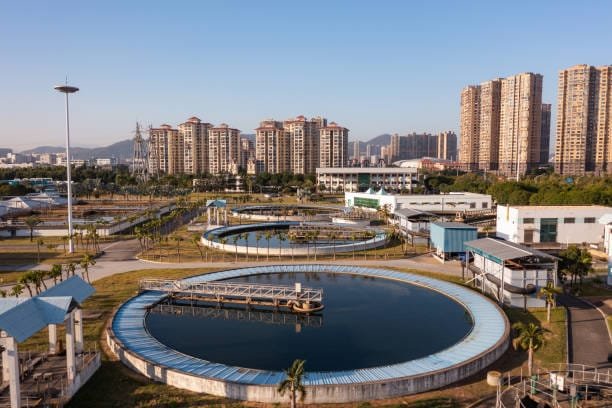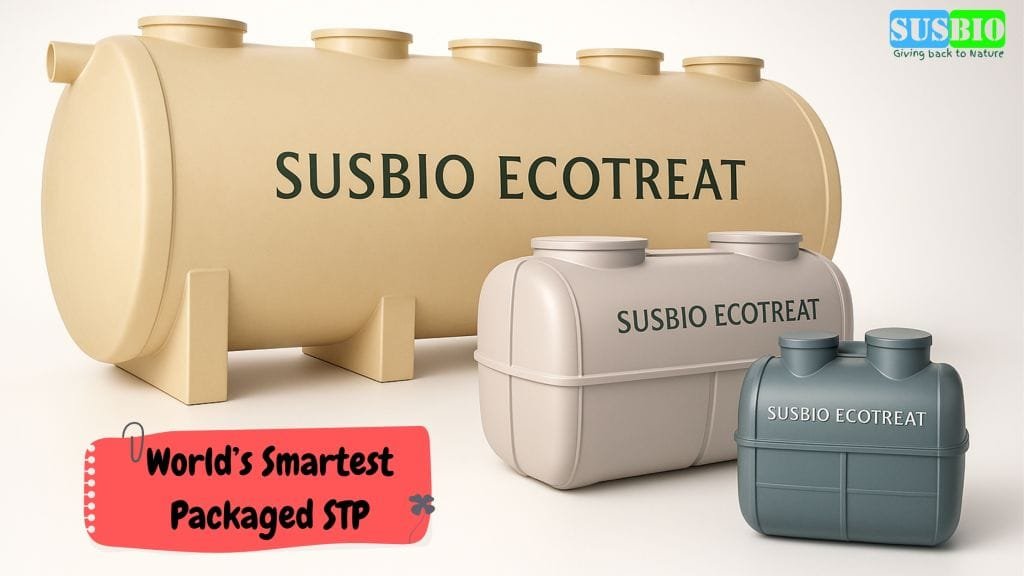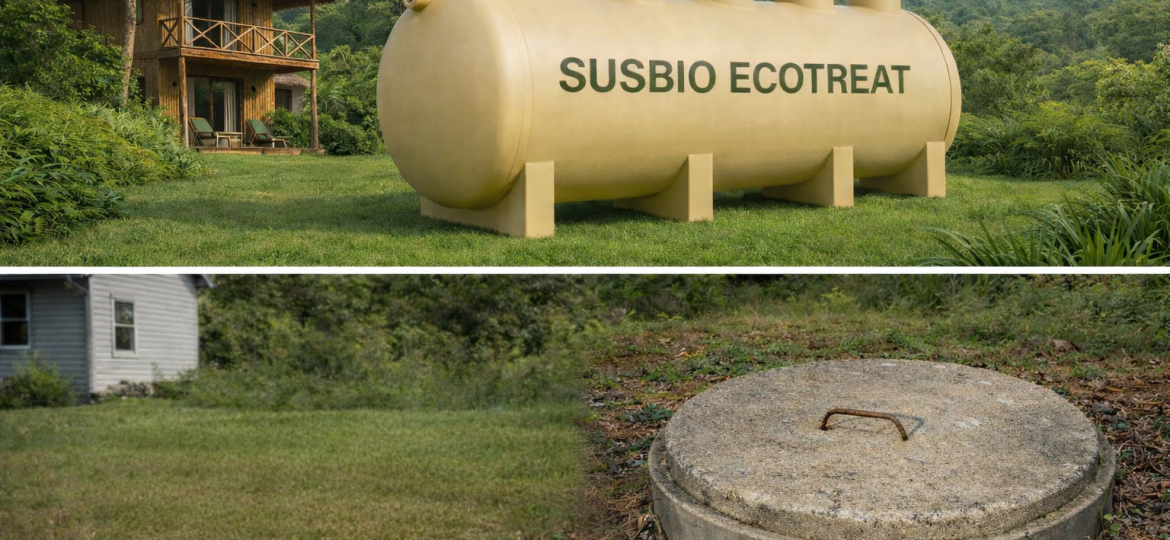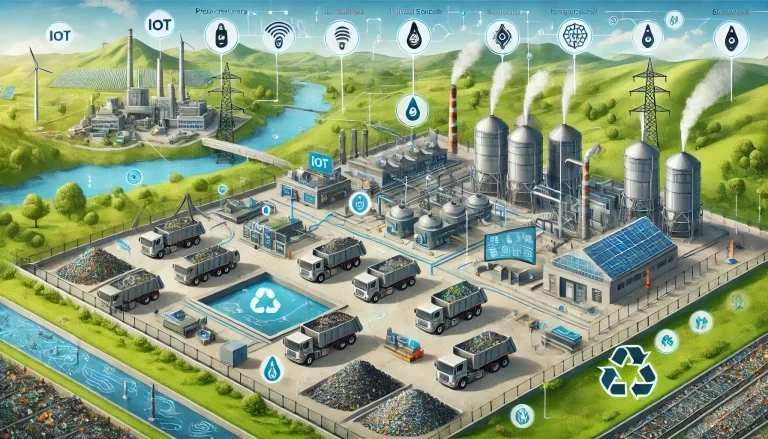Biological wastewater treatment plants have become essential for managing the growing environmental challenges of treating wastewater, especially in industries and municipalities. This eco-friendly approach leverages natural biological processes to break down organic contaminants, ensuring treated water meets safety standards before being discharged into the environment or reused.
What Is Biological Wastewater Treatment?

Biological wastewater treatment is a method that uses bacteria, protozoa, and other microorganisms to degrade organic pollutants in wastewater. Unlike chemical or physical treatments, which rely on external agents to treat water, biological treatment mimics natural ecosystems, where microorganisms consume and break down waste material. This method is highly effective for treating organic pollutants commonly found in domestic sewage, food processing waste, and industrial wastewater.
How Biological Wastewater Treatment Works
At its core, biological treatment revolves around the action of microorganisms that break down organic matter. There are three primary modes of operation, each depending on the environmental conditions required by the microorganisms involved:
Aerobic Treatment: Involves the use of microorganisms that require oxygen to break down organic matter into carbon dioxide, water, and biomass. This method is typically seen in activated sludge processes, where wastewater is mixed with microorganisms in an aeration tank. Oxygen is supplied through diffusers or aerators, enabling bacteria to digest organic pollutants efficiently.
Anaerobic Treatment: In contrast to aerobic processes, anaerobic treatment occurs in oxygen-free environments. Microorganisms break down organic pollutants, often generating methane and carbon dioxide as byproducts. This process is widely used for industrial waste and sludge treatment because of its energy efficiency, as the methane produced can be captured and used for power generation.
Anoxic Treatment: This method uses microorganisms that do not require oxygen but use other molecules such as nitrate to break down organic matter. Anoxic processes are crucial for removing nitrogen compounds from wastewater through nitrification and denitrification processes.
Key Stages in Biological Wastewater Treatment
A typical biological wastewater treatment plant follows these stages:
Preliminary Treatment: Large solids, debris, and grit are removed from the wastewater through screening and sedimentation.
Primary Treatment: Settling tanks remove suspended solids from the water, reducing the organic load that will be handled by the biological processes.
Secondary (Biological) Treatment: This is where biological treatment takes place, using either aerobic, anaerobic, or anoxic methods. The goal is to reduce the biochemical oxygen demand (BOD) and remove harmful contaminants.
Tertiary Treatment: Additional processes like filtration, disinfection, and nutrient removal ensure that the treated water meets strict discharge standards.
Zero Liquid Discharge and the Environmental Benefits of Biological Wastewater Treatment: A Sustainable Approach to Waste Management
As industries strive for more sustainable practices, wastewater management is becoming a key focus. Biological wastewater treatment, combined with Zero Liquid Discharge (ZLD) technology, offers an eco-friendly solution for reducing water consumption and environmental pollution. Let’s dive into the environmental benefits of these two technologies and how they support sustainable water management.
What is Biological Wastewater Treatment?
Biological wastewater treatment relies on natural microorganisms, such as bacteria, to break down pollutants in wastewater. Unlike chemical treatment methods that often introduce harmful substances, biological treatment uses natural processes, making it a more sustainable and eco-friendly solution. The treated water can be reused for various industrial applications, reducing the need for fresh water and minimizing environmental impact.
Zero Liquid Discharge (ZLD): A Game-Changer for Sustainability
Zero Liquid Discharge (ZLD) is an advanced treatment process designed to ensure that no liquid waste is discharged into the environment. All wastewater is treated, recycled, and reused, leaving only solid waste to be disposed of. ZLD is particularly valuable for industries looking to conserve water and reduce their environmental footprint.
Environmental Benefits of Biological Wastewater Treatment
- Reduction of Chemical Use: Biological treatment minimizes the need for harmful chemicals, which can be toxic to the environment. This approach reduces pollution and helps protect ecosystems.
- Energy Efficiency: Biological processes are energy-efficient compared to chemical methods, lowering greenhouse gas emissions and reducing the carbon footprint of wastewater treatment.
- Water Reuse: One of the most significant environmental benefits of biological wastewater treatment is water reuse. Once treated, wastewater can be recycled for industrial processes, irrigation, or even potable use in some cases, reducing the demand for fresh water and conserving this precious resource.
- Lower Sludge Production: Compared to conventional treatment methods, biological systems produce less sludge, reducing the need for costly and environmentally harmful sludge disposal.
How ZLD and Biological Treatment Work Together
When combined, biological wastewater treatment and Zero Liquid Discharge offer a powerful solution for industries aiming to reduce waste and conserve water. The biological treatment process purifies wastewater, while ZLD ensures that all treated water is reused, preventing any liquid waste from being released into the environment. This combination not only enhances sustainability but also helps industries comply with stringent environmental regulations.
Types of Biological Treatment Systems
Activated Sludge Systems: This is the most common type of biological wastewater treatment. Wastewater is aerated in tanks containing microorganisms that consume organic matter. The microorganisms clump together to form flocs, which settle out of the treated water in a clarifier, leaving clear water that is safe for discharge.
Moving Bed Biofilm Reactor (MBBR): In this system, biofilms grow on small plastic carriers that move freely in the wastewater. These carriers provide a large surface area for microorganisms to grow and break down organic matter, making MBBRs highly efficient for treating high-BOD waste in a smaller footprint.
Membrane Bioreactor (MBR): This advanced technology combines biological treatment with membrane filtration, providing high-quality effluent by removing both organic pollutants and suspended solids. MBRs are popular in places where space is limited or where high-quality treated water is required for reuse.
Sequencing Batch Reactor (SBR): The SBR is a variation of the activated sludge process, but instead of continuous flow, the treatment happens in batches. This allows for flexibility in treating different types of waste, with the benefit of optimizing nutrient removal.
How Biological Systems Effectively Treat Sewage and Wastewater Using Natural Processes in a Biological Wastewater Treatment System
Biological systems treat sewage by using natural processes to break down organic pollutants and solids. Here’s a simplified breakdown of the steps involved in a biological wastewater treatment system:
1. Preliminary Treatment
Large debris (plastics, sticks, etc.) and grit (sand, gravel) are removed using screens and grit chambers.
2. Primary Treatment
The sewage settles in tanks, separating heavier solids (sludge) that settle at the bottom, while oils and lighter solids float to the top.
3. Biological Treatment (Secondary Treatment)
Microorganisms break down organic matter:
- Aerobic Treatment: Oxygen is provided to bacteria in aeration tanks, where they consume organic waste.
- Anaerobic Treatment: Microorganisms break down waste in the absence of oxygen, producing biogas like methane.
- Trickling Filters: Wastewater passes over biofilms that degrade organic materials.
- MBBRs: Small plastic carriers support biofilms to treat wastewater in moving beds.
4. Tertiary Treatment (Advanced)
Further purification to remove nutrients (like nitrogen and phosphorus), followed by filtration and disinfection (using chlorine, UV light, or ozone).
5. Sludge Treatment
The sludge is thickened, digested, and dewatered before disposal or reuse (e.g., as fertilizer or for energy generation).
6. Final Disposal or Reuse
Treated water can be discharged into bodies of water or reused for irrigation or industrial processes, while treated sludge is either disposed of or used beneficially.
Summary
In a biological wastewater treatment system, microorganisms effectively degrade organic waste. The system then goes through filtration and disinfection, making it an eco-friendly and cost-effective solution for sewage treatment and water conservation.
What are the costs associated with biological wastewater treatment services
The costs of biological wastewater treatment services vary based on factors like system type, scale, wastewater complexity, and location. Here are the main cost components:
1. Capital Costs
- System Design and Engineering: Custom design, site assessments, and system selection.
- Equipment: Costs for aeration tanks, clarifiers, pumps, and monitoring systems.
- Construction and Installation: Infrastructure building, pipelines, and electrical systems.
Range: $100,000 to $10 million+, depending on the system size.
2. Operational and Maintenance (O&M) Costs
- Energy Costs: Vary by system type (aerobic vs anaerobic) and wastewater volume.
- Labor: Personnel costs for plant operation and maintenance.
- Consumables and Sludge Disposal: Replacement parts and waste treatment.
Range: $0.1 to $1 per cubic meter of treated wastewater.
3. Compliance and Monitoring Costs
- Testing and Reporting: Regular water quality tests and regulatory reporting.
4. Upgrades and Expansion
- Capacity Expansion: Adding equipment or upgrading systems as wastewater volume increases.
- Technology Upgrades: Retrofitting for improved efficiency.
5. Other Costs
- Consulting, Training, and Backup Systems: Additional consulting, staff training, and emergency backup costs.
Cost Estimates
- Small Scale: $50,000 to $500,000 capital cost; $5,000 to $50,000 annual O&M.
- Large Scale: $500,000 to several million dollars capital cost; higher O&M costs.
Factors Influencing Costs
- Wastewater type, system design, treatment capacity, and geographic location all affect costs.
For an accurate estimate, consult specialized service providers who can tailor solutions to your specific needs.
Advantages of Biological Wastewater Treatment
- Eco-Friendly: Biological processes rely on natural microbial activity, making them a sustainable option compared to chemical treatment.
- Cost-Effective: Once established, biological systems are generally cheaper to operate than chemical treatments, especially in terms of energy consumption and sludge handling.
- Versatile: Biological treatment can handle a wide variety of organic waste, making it ideal for municipal, industrial, and agricultural wastewater.
- Energy Recovery: Anaerobic treatment produces biogas, which can be captured and used as a renewable energy source.
Why Choose SUSBIO for Biological Wastewater Treatment?
At SUSBIO, we specialize in providing innovative biological wastewater treatment solutions tailored to your specific needs. Our advanced prefabricated sewage treatment plant SUSBIO ECOTREAT system utilizes cutting-edge technology to ensure efficient treatment while maintaining a low operational footprint. We offer both aerobic and anaerobic systems designed to meet the highest environmental standards, ensuring that your wastewater is treated effectively and sustainably.
Key benefits of SUSBIO’s biological treatment solutions include:
- Customizable Systems: We design systems that cater to the specific requirements of different industries, from food processing to municipalities.
- Energy-Efficient Designs: Our anaerobic systems capture biogas for energy use, reducing overall operational costs.
- Scalable Solutions: Whether you need a solution for a small community or a large industrial complex, we have the expertise to deliver.
Conclusion
Biological wastewater treatment is an essential process for managing the organic load in wastewater, offering a sustainable and cost-effective solution for industries and municipalities alike. With SUSBIO’s innovative treatment technologies, you can ensure compliance with environmental regulations while contributing to a greener and brighter future.
If you’re interested in learning more about biological wastewater treatment and how SUSBIO ECOTREAT can benefit your facility, get in touch with our experts today!







4 Comments
[…] ensures that the SUSBIO ECOTREAT is not just a product but a comprehensive solution for modern biological sewage water treatment […]
[…] sewage treatment plant (STP) that utilizes a dual treatment process combining biological wastewater treatment and chemical methods to ensure superior wastewater treatment. The plant’s energy-efficient […]
[…] the heart of a packaged sewage treatment plant is the biological wastewater treatment process, which utilizes aerobic bacteria to break down and digest the organic matter in the […]
[…] 0 By Shaivya Tyagi Latest Blogs November 5, […]